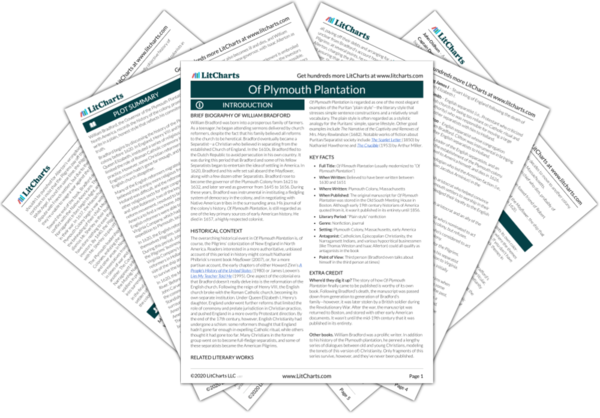Minor Characters
William Brewster
English separatist, leader of the separatist congregation in Leyden, and elder leader of the Plymouth colony in America. Bradford repeatedly praises Brewster for his wisdom and authority, and when Brewster dies in the 1640s, his death is greeted with great sadness in the colony.
John Pierce
An English investor in whose name a land patent (a claim of ownership over land in Plymouth) was taken out by the Virginia Company, with the approval of James I. Pierce never traveled to the New World, though, and in the end the Virginia Company revoked his patent.
Queen Elizabeth I
Queen Elizabeth I of England was responsible for instituting a series of reforms in the English church that limited the role of Catholic ceremony and the power of prelates (i.e., church leaders, such as bishops).
King James I
Stuart king of England following the death of Queen Elizabeth I.
John Smith
English separatist (i.e., Protestant who criticized the English church for being too reliant on Catholic ritual and prelate authority) who was responsible for moving a large number of other separatists with him to Holland.
Richard Clifton
English separatist whose congregation included William Bradford. Clifton was instrumental in bringing Bradford and other English separatists to Holland.
John Robinson
Leader of the English separatists, and an important figure in the establishment of the Plymouth colony. Robinson doesn’t travel to America himself, and dies in 1626.
Poliander
Dutch theologian who led the Arminian faction (i.e., followers of the theologian Jacobus Arminius) in the community of Leyden.
Sir Robert Nanton
English aristocrat who helped convince King James I to allow the Plymouth settlers to worship in their own way, provided that they pledged their loyalty to the English crown.
Sir John Worstenholme
English aristocrat and an ally of the Virginia Company.
Sir Thomas Smith
English aristocrat who’s nominated to act as the first governor for the Plymouth colony, but refuses.
Sir Edwin Sandys
English aristocrat who’s considered to act as the first governor for the Plymouth colony.
Mr. Martin
An English business contact for the Pilgrims.
Blackwell
English reformer who renounces his separatist beliefs and leads a small, unsuccessful expedition to Virginia.
Mr. Reynolds
The captain of a small ship that’s initially intended to bring Pilgrims to the New World.
Samoset
A Native American who greets the Pilgrims when they arrive in New England in 1620. Samoset speaks some English, since he’s traveled with English fishermen in the past.
Chief Massasoyt
A Native American chief who makes a treaty with the Pilgrims in their early days in New England.
Hobbamok
A Native American who comes to live with the Pilgrims.
Corbitant
A Native American who becomes embroiled in an argument with Hobbamok.
Captain Robert Gorges
English leader who is appointed to become the new Governor General of New England.
Sir Ferdinand Gorges
English leader, and father of Captain Robert Gorges, who serves as a member of the Commission for the Colonies in America.
John Lyford
A colonist who journeys to Plymouth plantation in 1624 and later turns out to be plotting against the religious authorities in Plymouth.
John Oldham
A colleague and friend of John Lyford.
Captain Dermer
An English captain who transports Squanto back to America.
Captain Wollaston
An English captain who leads a settlement in Massachusetts.
Mr. Morton
A Massachusetts colonist who sells guns to the Native Americans.
Mr. Rogers
A preacher who Isaac Allerton brings to the Plymouth colony, who turns out to be “crazed in the brain.”
Edward Ashley
A businessman who enters into a partnership with Isaac Allerton, endangering the survival of the Plymouth colony.
Governor John Endicott
Governor in Salem, Massachusetts.
Mr. Edward Winslow
Edward Winslow is a governor of the Plymouth colony, as well as a business agent in England on behalf of the colonists.
John Billington
The first person to be sentenced to death in the Plymouth colony.
Sir Christopher Gardiner
An English aristocrat who lives in Massachusetts, flees to live with Native Americans, and later tries to sue William Bradford.
Samuel Fuller
Physician for the Plymouth colony.
Governor Thomas Prince
Governor for the Plymouth colony in 1634 and 1638.
Hocking
A Piscataqua trader who’s shot and killed in a conflict with the Pilgrims.
Monsieur d’Aulnay
Leader of a group of French colonists who steal property from the Pilgrim settlement.
Girling
The captain of a ship that Myles Standish tries and fails to use to attack Monsieur d’Aulnay’s men.
Sassacus
A Pequot chief in the 1630s.
Arthur Peach
A Plymouth settler who’s arrested and executed for murder.
Thomas Jackson
A Plymouth settler who’s arrested and executed for murder.
Richard Stinnings
A Plymouth settler who’s arrested and executed for murder.
Daniel Crose
A Plymouth settler who’s arrested for murder, but who escapes.
Charles Chauncey
A reverend who arrives in Plymouth in 1638.
Chief Miantinomo
A Chief of the Narragansett tribe.
Chief Uncas
A Chief of the Monhig tribe.
John Pemberton
An English minister and noted opponent of the English separatists.
Mr. Norton
A reverend hired by Edward Winslow to live in Plymouth, who eventually decides to move to another colony.
Ralph Smith
A minister in Massachusetts.
Sachem
A Native American chief who dies, probably of smallpox.
Edward Southworth
A London-based friend of Robert Cushman.
Christopher Jones
The captain of the Mayflower, the ship that transports the Pilgrims to America in 1620.
